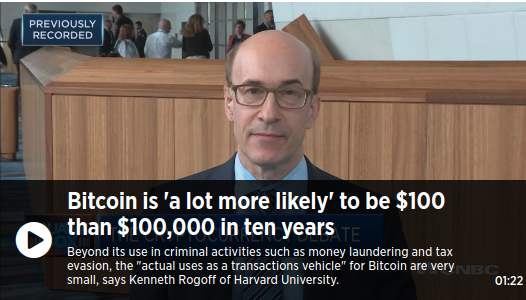
A decade from now, bitcoin is more likely to be $100 than $100,000, Harvard economist says
-
The likelihood of bitcoin falling to $100 was greater than that of the digital currency rising to $100,000 a decade from now, Harvard economist Kenneth Rogoff said.
-
Regulation would be a trigger for the move lower in prices, Rogoff said, although he acknowledged that it would not be an overnight development.
The likelihood of bitcoin prices falling to $100 is greater than that of the digital currency trading at $100,000 a decade from now, Harvard University professor and economist Kenneth Rogoff said on Tuesday.
"I think bitcoin will be worth a tiny fraction of what it is now if we're headed out 10 years from now … I would see $100 as being a lot more likely than $100,000 ten years from now," Rogoff told CNBC's "Squawk Box."
"Basically, if you take away the possibility of money laundering and tax evasion, its actual uses as a transaction vehicle are very small," the former chief economist of the International Monetary Fund (IMF) said.
While bitcoin has been associated with illicit transactions, estimates of the proportion of the digital currency used in illegal activities vary. Shone Anstey, the co-founder and president of Blockchain Intelligence Group, gauged that the level of illegal transactions in bitcoin had fallen to 20 percent in 2016 and was "significantly less than that" in 2017.
Rogoff said that government regulation would be a trigger for the drop in bitcoin prices, although he stressed that it would take time to develop a global framework of regulation.
"It really needs to be global regulation. Even if the U.S. cracks down on it and China cracks down, but Japan doesn't, people will be able to still launder money through Japan," he said.
Meanwhile, regulatory developments in the cryptocurrency landscape depend on individual countries. Bitcoin was legalized as a currency by Japan last year and the country has also officially recognized a number of cryptocurrency exchanges. But a massive theft of tokens worth $530 million in January saw authorities push for improvements.
South Korea, on the other hand, has implemented rules that allow cryptocurrency trading only from real-name bank accounts.
Private sector 'invented everything' related to currency
Bitcoin traded around $11,242.61 during Tuesday Asia morning trade, according to industry site CoinDesk. The digital currency is down around 16 percent this year, having fallen from a record high of more than $19,000 in December last year.
But one reason authorities have been slow to act when it comes to regulating bitcoin is due to the anticipation of the technology behind the digital currency, according to Rogoff.
"They want to see the technology develop," Rogoff said, adding that the private sector has historically "invented everything" in the history of currency, from standardized coinage to paper currency.
Bitcoin is just one application of blockchain technology, a term used to refer to distributed ledger technology that allows transactions to be recorded and maintained, which has been identified as a major area of growth.
This is not the first time the economist has pointed to cryptocurrency prices falling. Before bitcoin sold off in December last year, Rogoff told CNBC last October that prices of the digital currency would "collapse" amid attempts by governments to regulate the space.
Author Cheang Ming | @cheangming Published 1 Hour Ago
Posted by David Ogden Entrepreneur

Alan Zibluk – Markethive Founding Member
